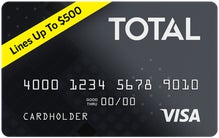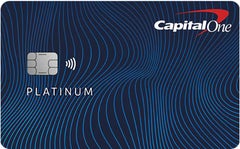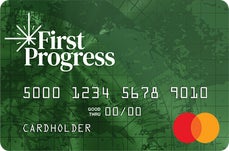Total Visa® Card review: Building your credit comes at a steep price
Despite being designed for people looking to revamp their credit, the Total Visa turns out to be a lackluster credit-building* tool
The Bankrate promise
At Bankrate we strive to help you make smarter financial decisions. While we adhere to strict , this post may contain references to products from our partners. Here's an explanation for .
Snapshot
2.7
Bottom line
Intro offer
N/A
Rewards rate
1%
Annual fee
See Terms*
Regular APR
35.99%*
2.7
Bankrate score
Cost of membership
Ease of building credit
APR
Features
Reward Details
Card Details
Remove a card to add another to compare
Remove a card to add another to compare
Total Visa® Card overview
Having a low score can be challenging because you might not qualify for the best credit cards or personal loans, so you typically have to settle for a credit card for bad credit — complete with burdensome interest rates and fees.
Though anyone with low credit would likely qualify for the Total Visa card, it’s not necessarily the best option in this category. It does come with some rewards, but this card's interest rate will keep your debt piling up if you don’t pay your balance in full every month. Plus, it charges you fees at every turn.
The Total Visa card might be an option for people with bad credit who don’t want to open a secured card, but rival unsecured cards for bad credit may offer more favorable rates. You will likely find much better terms with excellent secured credit card options.
-
Rewards
- 1 percent cash back
Expert Appraisal: Unimpressive
See our expert analysis -
Rates and fees
- No purchase intro APR
- No balance transfer intro APR
- Program fee: $95.00 (one-time fee)
- Monthly servicing fee: Varies by credit limit
- Annual fee: Varies by credit limit
- Regular APR (ongoing): 35.99%*
Expert Appraisal: Typical
See our expert analysis -
Credit-building features
- No security deposit required
- Reports activity to three credit bureaus
Expert Appraisal: Typical
See our expert analysis
Total Visa card pros and cons
Pros
-
This card reports to all three credit bureaus, helping you to boost your credit score over time.
-
This card is accepted at millions of in-person and online stores in the U.S.
-
No security deposit is required.
Cons
-
The fees are extraordinarily high, and the card touts a high APR — making carrying a balance very expensive.
-
The annual fee and monthly servicing fee are both determined by the credit limit you're approved for, potentially proving to be very costly.
-
The card doesn’t allow cardholders to make purchases outside the U.S., limiting its use for travelers.
How to build credit with the Total Visa card
The Total Visa card doesn't offer the most robust line of credit-building features, but it reports to all three credit bureaus, which is the most important thing when you're building or repairing your credit.
Most credit-building cards don't offer rewards at all, so the card's rewards program is a perk worth mentioning. Plus, the way the program works — 1 percent cash back in the form of statement credits on all payments made to the card's balance — could be a good incentive to stay on top of your balance.
Why you might want the Total Visa card
The Total Visa card is simple to apply for and quickly gets you on the path to improving your credit. One of the best features is that there is no security deposit, lowering your initial out-of-pocket costs.
Credit-building: Easy to boost your credit score with responsible use
You don't have to go through many hoops to get the Total Visa card since it's meant for those who need to repair their credit standing.
- Simple approval: This card doesn’t have a minimum credit requirement and is available in most states, excluding New York. After you apply, you should get a response immediately.
- No security deposit: If you’re dead set against opening a secured credit card, the Total Visa should at least get a glance from you. You won’t have to offer any cash to secure your credit limit — although the cash you’ll pay to cover the card’s fees will add up quickly, taking away a lot of the benefit from having an unsecured card.
- Reports to all three major credit bureaus: While many cards only report to one or two credit bureaus, the Total Visa reports to all three. This helps you build* your credit at each one if you show consistent and responsible credit card use. Remember, rebuilding credit depends on factors like making on-time payments, keeping your credit utilization ratio low and paying at least the minimum monthly payment.
Why you might want a different card
Although the Total Visa card can help you build your credit score back up, there are far more disadvantages than advantages, such as minimal rewards or incentives for purchases, no perks besides basic credit building and a hefty amount of fees.
Rewards: Small rewards program and no welcome offer
As a credit card designed to help you rebuild* your credit, the Total Visa credit card is extremely bare-bones. It offers only 1 percent cash back on payments made to the card's balance, and it doesn't come with an introductory bonus that you might see with other unsecured credit cards for bad credit. For instance, the Upgrade Cash Rewards Visa® features rewards and a bonus after opening a Rewards Checking Plus account and making three debit card transactions.
The only type of intro offer you can expect from this card is a waived monthly servicing fee for your first year. But if you choose to go with the Total Visa to help rebuild* your credit, you should work during those 12 months to build a credit strong enough to qualify for a card that doesn’t charge servicing fees in the first place.
Cardholder perks: Only offers basic credit-building features
The Total Visa card has one purpose and one purpose only — rebuilding* credit. For people with damaged credit, it can help start the journey back to healthy credit. But like most credit-building cards it doesn’t have many perks or features.
However, standout unsecured cards for bad credit might include card protection and more credit-building benefits, like the Credit One Bank® Platinum Visa® for Rebuilding Credit*, which offers free access to your monthly credit score and zero fraud liability.
Rates and fees: High APR coupled with numerous fees
A high interest rate and excessive fees plague the Total Visa card, making it difficult to recommend for even the worst situations.
To get started with the Total Visa card, you’ll first pay a one-time program fee of $95 — and that’s before your annual fee is placed on your card balance. Annual fees are determined by the amount of credit you're approved for. For instance, if you are approved for a $500 credit limit, you'll pay $125 for the first year, then $48 thereafter.
That doesn't even include the monthly servicing fee — also determined by credit limit. For the same $500 credit limit, you won't have to pay a monthly servicing fee for the first year, but will pay $123 thereafter in $10.25 monthly increments. As you can see, these fees would eat up your credit limit very quickly without you spending a dime.
The APR for this card is 35.99%* and 35.99%* for cash advances. While the cash advance fee is waived the first year, transactions will cost you the greater of $10 or 3 percent after that. You’ll also pay an up to $41 fee for late or returned payments.
How the Total Visa card compares to other cards for bad credit
Beginning your credit-building journey can be daunting. Finding the right credit-building tool is key to helping you boost your score (in addition to keeping up positive credit behaviors over time). The Total Visa leaves a lot to be desired compared to other credit cards for bad credit. There are many other card options — including both secured and unsecured credit cards — that are less expensive and more rewarding.

Annual fee
Intro offer
Rewards rate
Earn 1% Cash Back Rewards on payments.
Recommended Credit Score
A FICO score/credit score is used to represent the creditworthiness of a person and may be one indicator to the credit type you are eligible for. However, credit score alone does not guarantee or imply approval for any financial product.

Annual fee
Intro offer
Rewards rate
Earn up to 10% cash back on everyday purchases.
Recommended Credit Score
A FICO score/credit score is used to represent the creditworthiness of a person and may be one indicator to the credit type you are eligible for. However, credit score alone does not guarantee or imply approval for any financial product.

Annual fee
Intro offer
Rewards rate
Earn 1% cash back rewards on eligible gas, grocery purchases and mobile phone, internet, cable and satellite TV services. Terms apply.
Recommended Credit Score
A FICO score/credit score is used to represent the creditworthiness of a person and may be one indicator to the credit type you are eligible for. However, credit score alone does not guarantee or imply approval for any financial product.
Is the Total Visa card right for me?
While there are more attractive choices to rebuild credit, anyone looking to improve their credit score can use the Total Visa to graduate to a better option with responsible credit use. This card may be a good fit if you:
- Have less-than-ideal credit and limited options when it comes to credit cards you'd be eligible for.
- Don’t mind that the Total Visa doesn’t have many perks besides credit building.
- Don't want a secured credit card and would prefer to forgo the security deposit.
Alternate picks
*The information about the Credit One Bank® Platinum Visa® for Rebuilding Credit has been collected independently by Bankrate. The card details have not been reviewed or approved by the issuer.
Frequently asked questions
How we rated this card
Our proprietary card rating system takes into account a mix of factors when scoring credit cards for students and people building credit, including each card’s cost, APR, credit-building tools and more.
We analyzed over 50 of the most popular cards designed for students and people with no credit history, bad credit or a fair credit score and scored each based on where its key features stood in relation to others in its category.
Here are some of the key factors that gave this card its score:
* See the online application for details about terms and conditions for these offers. Every reasonable effort has been made to maintain accurate information. However all credit card information is presented without warranty. After you click on the offer you desire you will be directed to the credit card issuer's web site where you can review the terms and conditions for your selected offer.
Editorial Disclosure: Opinions expressed here are the author's alone, and have not been reviewed or approved by any advertiser. The information, including card rates and fees, is accurate as of the publish date. All products or services are presented without warranty. Check the bank’s website for the most current information.












